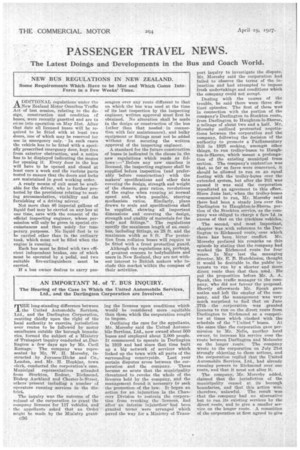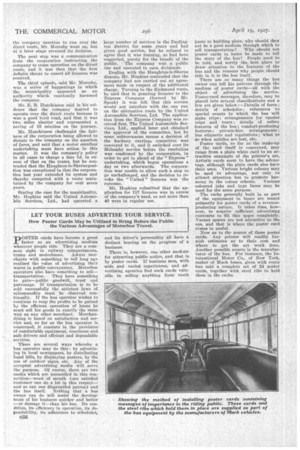AN IMPORTANT M. of T. BUS INQUIRY.
Page 58

Page 60

If you've noticed an error in this article please click here to report it so we can fix it.
Hearing of the Case in Which the United Automobile Services, Ltd., and the Darlington Corporation are Involved.
THE long-standing difference between the United Automobile Services, Ltd., and the Darlington Corporation, centring chiefly upon the right of the local authority to exercise jurisdiction over routes to be followed by motor omnibuses ontside the, borough .boundaries, formed the subject of a Ministry of Transport inquiry conducted at Darlinggon a few days ago by Mr. Cecil Ramage. • The company was represented by Mr. W. H. Moresby, instructed by Joyneon,Hicks and Co., London,and Mr. H. Hopkins, town clerk,conducted the corporation's ease. Municipal -representatives attended from Stockton, Redcar, Richmond, Bishop Auckland and Chester-le-Street. others present including a number of operators running services in the dis
trict. _ The inquiry was the outcome of the refusal of the corporation to grant the company licences for 117 vehicles, and the appellants asked that an Order might be made by the Ministry grant lug the licences upon conditions which would be considered more equitable than those which the corporation sought to impose.
Outlining the case for the appellants, Mr. Moresby said the United Automobile Services, Ltd., now owned about 500 buses and employed about 2,000 people. It commencedto operate in Darlington in 1919 and had since that time built up a big network of services which linked up the town with all parts of the surrounding countryside. Last year certain disputes arose between the corporation and the company. These became so acute that the municipality threatened to revoke the whole of the licences held by the company, and the management found-it necessary to seek the protection of the law.-It-began an action for an injunction in the Chancery Division to restrain the corporation from revoking the licences, had after an interim injunction' had been granted terms were arranged which paved the way for a Ministry of Trans port inquiry to investigate the dispute. Mr. Moresby said the corporation had failed to observe the terms of the injunction and had attempted to impose' fresh undertakings and conditions which the company could not accept.
Dealing with the causes of the trouble, he said there were three distinct episodes. The first of these was in connection with the portion of the company's Darlington to Stockton route, from Darlington to Haughton-le-Skerne, a-mileage of aboht two and a half. Mr. Moresby outlined protracted negotiations between the corporation and the company, following the decision of the authority to promote a Parliamentary Bill in 1925 seeking. amongst other things, to run trolley-buses to Haughton-le-Skerne, which meant a prolongation of the existing municipal tram section. The company's contention was that, so far as fares were concerned, it should be allowed to run on an equal footing with the trolley-buses over the extended system, but after the Bill was passed it was said the corporation repudiated an agreement to this effect.
Since Jute wben_the trolley-buses commenced to run, Mr. Moresby said there had been a steady loss over the Darlington to Haughton-le-Skerne portion of the Stockton service, as the company was obliged to charge a fare id. in excess of that on the trackless vehicles.
The second, and most important, chapter was with reference to the Dare lington to Richmond route, over which there has been bitter ' conflict. Mr. Moresby prefaced his remarks on this episode by stating that the company had worked the Richmond route for four
years. In May last the managing•director, Mr. E. B. Hutchinson, thought it would be desirable in the public interests to run by a shorter and more direct route than that -then used.He put the proposition before Mr. A. A. Speak, then traffic manager to the company, wino did not favour the proposal. Shortly afterwards Mr. Speak gave notice and left the employ' of the company, and the managementwas very much surprised to find that on June 27th the _corporation was granted licences to runon the direct route from Darlington to Richmond as a competitor at times which clashed with tho schedule of the " United " buses. At the same time the corporation gave permission to Mr. Neils, another local owner, to increase his service over the route between Darlington and Melsonbv On the longer route. The company wrote to the corporation on July 21st Strongly objecting to these actions, and the corporation replied that the United Automobile Services, Ltd., had already running powers. to Richmond over one route, and that it must not alter it.
The company, Mr. Moresby added, claimed that the jurisdiction of the municipality ceased at its borough boundaries, and that this action was, therefore, unlawful. The result was that the company had no alternative but to run its existing services by the direct route, and to give a smaller service on the longer route. A committee of the corporation at first agreed to give the company sanction to run over the direct route, Mr. Moresby went on, but at a later stage reversed its decision.
The next step was a communication from the corporation instructing the company to cease operation on the direct route, and it was then that the first definite threat to cancel all licences was received.
The third episode, said Mr. Moresby, was a series of happenings in which the municipality appeared as an authority which constantly harassed the company.
Mr. E. B. Hutchinson said in his evidence that the company desired to operate over the direct route because it was a good level road, and that it was two miles shorter and represented a saving of 15 minutes on the journey.
Mr. Hutchinson challenged the fairness of the corporation being allowed to dictate to the company on the question of fares, and said that a motor omnibus undertaking must have action in this matter. It was the company's policy in all cases to charge a fare id. in excess of that on the trams, but he contended that the Haughton-le-Skerneposition was exceptional in that the corporation last year extended its system and thereby competed with a route maintained by the company for over seven years.
Stating the ease for the municipality, Mr. Hopkins said the United Automobile Services, Ltd, had operated a large number of services in the Darlington district for some years and had given good service, but he refused to agree that it was running, as had been suggested, purely for the benefit of the public. The company was a public one and operated to earn dividends.
Dealing with the Raughton-le-Skerne dispute, Mr. Hopkins contended that the company had not carried out an agreement made in respect of the additional charge. Turning to the Richmond route, he said that in granting licences to the Express Company (formed by Mr. Speak) it was felt that this service would not interfere with the one run on the alternative route by the United Automobile Services., Ltd. The application from the Express Company was received first. The United Automobile Services, Ltd., applied later and obtained the approval of the committee, but by some subterranean means a decision of the hackney carriage committee was conveyed to it, and it switched over its Melsonby service before the resolution was confirmed by the corporation, in order to get in ahead of the " Express " undertaking, which began operations a day or two afterwards. The corporation was unable to allow such a step to go unchallenged, and the decision to reyoke the "United" licences was the outcome.
Mr. Hopkins submitted that the application for 117 licences was in excess of the company's need, as not more than 40 were in regular use.












































































































